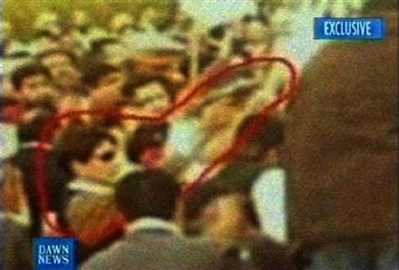
We welcome back to PID Radio two of our favorite researchers and crypto-political analysts, Paul and Phillip Collins. The brothers have been looking into connections between Western intelligence and the “Islamic bomb” created by Pakistani nuclear scientist A.Q. Khan.
Did Bhutto’s apparent desire to allow the International Atomic Energy Administration to investigate Khan and his network lead to her death?
Links:
- The Paul and Phillip Collins archive at The Conspiracy Archive
- Why the Ghost of A.Q. Khan Still Walks the Earth by Paul & Phillip D. Collins
- Western Intelligence and the Rise of the Muslim Brotherhood by Paul and Phillip D. Collins
- The Creation of the Saudi Crime Syndicate by Paul & Phillip D. Collins
- Wikipedia: A.Q. Khan
- Wikipedia: James Jesus Angleton
- Bhutto to David Frost: “Osama is dead”
- U.S. Troops Head to Pakistan
Note that this was written the day before Bhutto was killed
Click arrow on player below to listen now, or right-click (control-click for Macs) the “download” link to save the mp3 file to your computer.

Who is Baitullah Mehsud?
By Anthony Bruno
“Allah on 480 occasions in the Holy Koran extols Muslims to wage jihad. We only fulfill God’s orders. Only jihad can bring peace to the world…We will continue our struggle until foreign troops are thrown out. Then we will attack them in the US and Britain until they either accept Islam or agree to pay jizya (a tax in Islam for non-Muslims living in an Islamic state).” These are the words of Baitullah Mehsud, militant leader of the Mehsud tribe of the Pashtun ethnic group, from a BBC interview in January 2007.
Baitullah Mehsud is not a household name—yet. Terrorist leaders tend to be nameless and faceless until their deeds earn them infamy. Osama bin Laden’s name was largely unknown to the public until Sept. 11, 2001. But with General Pervez Musharraf’s recent imposition of emergency rule in Pakistan and his desperate struggle to hang onto power, Baitullah’s name has begun to emerge in daily news reports coming out of Pakistan. Some portray him as an annoying stone in Musharraf’s shoe, just one of several problems confronting the general. But others see Baitullah as a pivotal figure who could tip the political balance in Pakistan toward militant Islam and spark terror attacks throughout the world.
Pakistani Terrorist Baitullah Mehsud
Baitullah commands a force of 20,000 to 30,000 fighters in the tribal areas of northwest Pakistan. He has dispatched suicide-bombers to kill Pakistani police and soldiers in Swat, Kohat, Bannu, Dera Ismail Khan, and Peshawar. On August 30, his forces brazenly captured 213 Pakistani soldiers and held them hostage for two months until his demands were met. One day after declaring the current state of emergency, General Musharraf reached a settlement with Baitullah, exchanging 25 militants in government custody for the captured troops. Musharraf later admitted that these men were trained suicide bombers, and one of them was under indictment for participating in a suicide bombing. As part of the deal, Baitullah agreed to expel foreign militants from his territories and stop attacking the army. But Baitullah has signed peace accords with the Pakistani government before and reneged on his word.
General Pervez Musharraf, President of Pakistan
Baitullah has no formal education or religious schooling but is a natural leader with keen political instincts. He controls a critical battleground in the war on terror, South Waziristan, a tribal territory in Pakistan on the Afghanistan border about the size of New Jersey. The Taliban currently thrive in this region and Al Qaeda is welcome there. There’s a better than even chance that Osama bin Laden is living somewhere in Waziristan under Baitullah’s protection.
Map with Waziristan Locator
Baitullah’s advocates say he has brought peace to the region, but detractors note that the peace came at a price—literally. Like a Mafia boss, he and his lieutenants shake down the populace for protection money. He’s closely allied to Taliban leader Mullah Omar, and, like the Taliban, he enforces an extreme form of shariah in his territory. Women must observe a strict form of purdah, and men are forbidden to shave their beards. Playing music and watching videos are against the law. He has ordered the murder of adulterers by stoning. There are few Pakistani government courts in the region, and the Waziristanis seldom use them. Instead they go to Baitullah to settle their differences. In South Waziristan and parts of North Waziristan, he is the law.
Benazir Bhutto, Former Prime Minister of Pakistan
Baitullah is said to have a signature method of dealing with people he deems disloyal. He first sends the offender 1,000 rupees, a spool of thread, a needle, and a note instructing the person to have a kafan (burial shroud) made within 24 hours. When the time is up, the person is murdered.
Osama bin Laden
Baitullah is also said to have ordered the suicide-bomber attack on Benazir Bhutto the day after she returned to the country on October 18, 2007. The explosions were close enough to Bhutto’s car to shatter the windshield. Baitullah denies that he was behind the attack, though it’s no secret that he despises her for her pro-American stance. He also opposes Musharraf for the same reason.
Both the Taliban and Al Qaeda have sought his support to accomplish their particular goals. The Taliban want to concentrate their efforts on waging war in Afghanistan and regaining control there. Al Qaeda militants want a worldwide jihad against all governments aligned with the United States, starting with Pakistan. Baitullah can send forces east into Afghanistan to help Taliban fighters or keep them in Pakistan to undermine the government. So far he has done both.
Since Sept. 11, 2001, the United States has given Pakistan $10 billion to help fight terrorism. But some believe that some of that money found its way into Baitullah Mehsud’s accounts. If so, what has he done with it? Is he content to serve the interests of the Taliban and Al Qaeda, or does he have ambitions of his own—even nuclear ambitions?
Who is Baitullah Mehsud? Part 2
Tribal militant leader Baitullah Mehsud has shown a disturbing interest in Dr. Abdul Qadeer Khan, the controversial father of Pakistan’s nuclear arms program.
By Anthony Bruno
Tribal militant leader Baitullah Mehsud has shown a disturbing interest in Dr. Abdul Qadeer Khan, the controversial father of Pakistan’s nuclear arms program, who in 2004 admitted to selling nuclear technology to Iran, Libya, and North Korea on the black market. Dr. Abdul Qadeer Khan reported that when Benazir Bhutto returned to Pakistan in October of this year, Baitullah instructed Al Qaeda militants in Karachi to kill her for “three major offenses against Islamists.” First, she supported the Pakistani military attack on Lal Masjid (the Red Mosque) in Islamabad on July 10, 2007—Lal Masjid was considered a hotbed of Islamist radicalism; one hundred and sixty-four Pakistani special-forces commandos stormed the mosque and madrassah, killing at least 20 and injuring over 100. Second, Bhutto has made it clear that if she takes power in Pakistan, she will allow American forces to search for Osama bin Laden inside Pakistan’s borders. Third, she has said that if elected, she would allow the International Atomic Energy Agency to question A. Q. Khan.
Lal Masjid, The Red Mosque
Why does Baitullah care about Khan? Is he trying to protect a valuable asset in the international terrorist community? Or does he fear that Khan will implicate others in his nuclear dealings, possibly including warlords like Baitullah or their Islamist allies within the Pakistani security and intelligence services?
Though he claims to be motivated by his deep devotion to Islam, Baitullah doesn’t shun a profit when there’s one to be made. The Taliban paid him $70,000 to hunt down diplomats from countries that published cartoons depicting Allah. On February 8, 2005, Baitullah and four other militant tribal leaders signed a peace agreement with the Pakistani government. They drove a hard bargain, agreeing to sign only after being paid $540,000. As part of the agreement, Baitullah promised not to support the Taliban or Al Qaeda, but at the peace negotiations he openly swore his allegiance to the Taliban’s Mullah Omar. In demanding higher payments, the other leaders said that they needed more money because they were in debt to Al Qaeda and felt it was a matter of honor to pay off that debt. The United States has given Pakistan over $10 billion in aid since Sept. 11, 2001. Did the money that was paid to these militant leaders come from the American purse, and did it ultimately thereby find its way to America’s sworn enemies?
Taliban’s Mullah Omar
With Pakistan still in the tight grip of emergency rule, American officials worry that General Musharraf will pull troops out of the tribal regions to maintain law and order in Pakistan’s cities. Baitullah has been a major problem for the military in his territories. There’s no telling what he might do if the military presence in North and South Waziristan is reduced or eliminated.
Abdullah Mehsud
Until 2005, Baitullah lived in the shadow of his daring and charismatic brother, Abdullah Mehsud, who, with his long black hair, was considered a terrorist rock star. Abdullah fought with the Taliban in Afghanistan against the Northern Alliance and in 1996 lost a leg when he stepped on a land mine. He was taken captive by warlord Abdul Rashid Dostum who turned him over to American forces. Abdullah Mehsud was sent to Camp Delta at Guantanamo Bay Naval Base in Cuba and held for two years, insisting the whole time that he was just an innocent tribesman. He was released in 2004 for reasons which remain unclear and returned to Waziristan. Soon after his return, he orchestrated the kidnapping of two Chinese engineers working on a dam in his region, proclaiming that Beijing was guilty of killing Muslims. He also ordered an attack on Pakistan’s Interior Minister in which 31 people perished. In July 2007 he died in a clash with Pakistani military forces as they raided his residence.
Abdul Rashid Dostum
By contrast, Baitullah keeps a much lower profile. He refuses to be photographed and keeps his face covered in public. He reaches out to his people through FM radio broadcasts. He crosses the border into Afghanistan at will to fight against the “crusaders.” Left unchecked, it’s uncertain where and with whom he will strike next.
Baitullah Mehsud
Baitullah made his intentions clear this past January when he said, “As far as jihad is concerned, we will continue to wage it. We will do what is in the interest of Islam.” Speaking of the growing threat of Baitullah’s militia, Pakistani military analyst, Hasan-Askari Rizvi, told The New York Times, “The army has never faced such a serious challenge in the tribal areas.”
New Years Eve 2007 Show
The Brothers Collins on the events in Pakistan and the Middle East
http://vyzygoth.com/audio/collins.mp3
Apparently Great Britain has to pay out millions in compensation to former Guantanamo Bay detainees who accuse them of being party in some way to their imprisonment. This cop-out wouldn’t even be happening if Great Britain had appropriately stood back from the illegal goings-on there in the first place as it ought to have done.